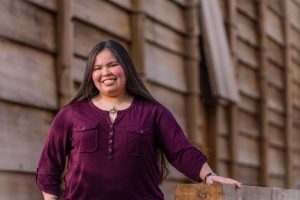Adina Williams is from the Squamish Nation and a descendant from the ‘Namgis (Kwakwaka’wakw) peoples from Alert Bay, B.C. She grew up and continues to live in her home community of Xwemelch’stn, or the Capilano Reserve, in what is now more commonly known as West Vancouver. Adina is currently a fourth-year student in First Nations and Indigenous Studies, as well as Anthropology at UBC.
You’ve been a member of the UBC community since before you became a student, can you talk about the ways you’re able to practice Indigenous culture on campus?

I’ve been around for a while! However, one of the most beautiful places on campus is one that I’ve just discovered. I recently finished an internship at the Indigenous Health Research and Education Garden at the UBC Farm, and it was a wonderful experience. The garden is home to several traditional Indigenous plants and medicines and is a respectful and beautiful community to be a part of. The Medicine Collective at the garden also hosts workshops such as tea making and salve making that I encourage Indigenous students to sign up for if this is of interest to you!
What is one tip you would offer current and future UBC Indigenous students in terms of practicing Indigeneity on campus and getting involved with Indigenous clubs or organizations on campus?
There are so many opportunities to be involved with on campus these days. My advice would be to go to a Tuesday lunch at the Longhouse because there will be representatives from student clubs and organizations such as the Indigenous Leadership Collective or the First Nations Studies Student Association (FNSSA) there, as well as faculty and staff from different units all over campus who give a presentation at each lunch to show students how they can be involved with their particular unit or initiative. Getting involved on campus is a great way to meet other people, make connections, and most of all, participate in meaningful and rewarding work.
How do you balance your home community involvement with your involvements at UBC?
Yes, I’m really passionate about participating in work that engages with Indigenous peoples and communities! More often than not the work I do at home or in the greater community connects with the work that I do on campus, and vice versa. While I enjoy this work, it’s important that it doesn’t happen at the expense of my studies or my own health and wellbeing. Prioritizing my studies, gym time, and sleep is always of utmost importance to me, and all this, in turn, gives me more energy to do my best work elsewhere!
What has been a project that you have been proud to work on while being at UBC? What is your advice for students to get involved with meaningful projects within the campus community?
I’m currently working with the Indigenous Initiatives team at the Centre for Teaching, Learning and Technology (CTLT), and we are rebooting What I Learned in Class Today, which is an online educational resource that explores difficult conversations on Indigenous issues that take place in UBC classrooms. I’m proud to be a part of this project, not only because the existing project is so important, but because it’s also so relevant today, and I’m happy to know that this important update will help address some of the current issues that many Indigenous students face while taking classes at UBC. My advice for students is to pay attention to emails such as the The Talking Stick from by the First Nations House of Learning and The Post from ASA and FNIS because they always advertise interesting jobs, news, and events to get involved in both on and off campus.
You have become such a well-known speaker on campus. Do you have any advice on how Indigenous students can improve their public speaking skills?
I’m definitely more confident now than I used to be. It’s taken a lot of time and practice for me to believe that my voice is actually important. Don’t be afraid to use your voice to speak to issues or topics that you really care about, because your perspectives will add to the larger dialogue and help others who care just as much as you to think about the topic more deeply. Nervousness can be overwhelming, but it is natural, and it gets better each time. And finally, don’t be afraid to ask other people for advice or just for some reassurance before a speech. I don’t think I’ve done one speech without having some encouragement beforehand!
Where on campus is ‘home’ for you? What makes this space meaningful to you?
The First Nations Longhouse at UBC is definitely my home away from home. I was lucky to be able to spend a lot of time at the Longhouse throughout my childhood and youth, so I naturally feel a connection there. But it has been meaningful during my time as a student because the Longhouse is where I have made connections with so many incredible people, including Indigenous students, faculty, staff, alumni, and people from the greater community. In fact, a lot of the things I am involved in, not only at UBC but outside of the university as well, have started out of opportunities that began at the Longhouse. It is truly a wonderful and welcoming place to be, and I really want to encourage all Indigenous students to visit more often.
ASA Tip: Check out the website, What I Learned In Class Today here.


